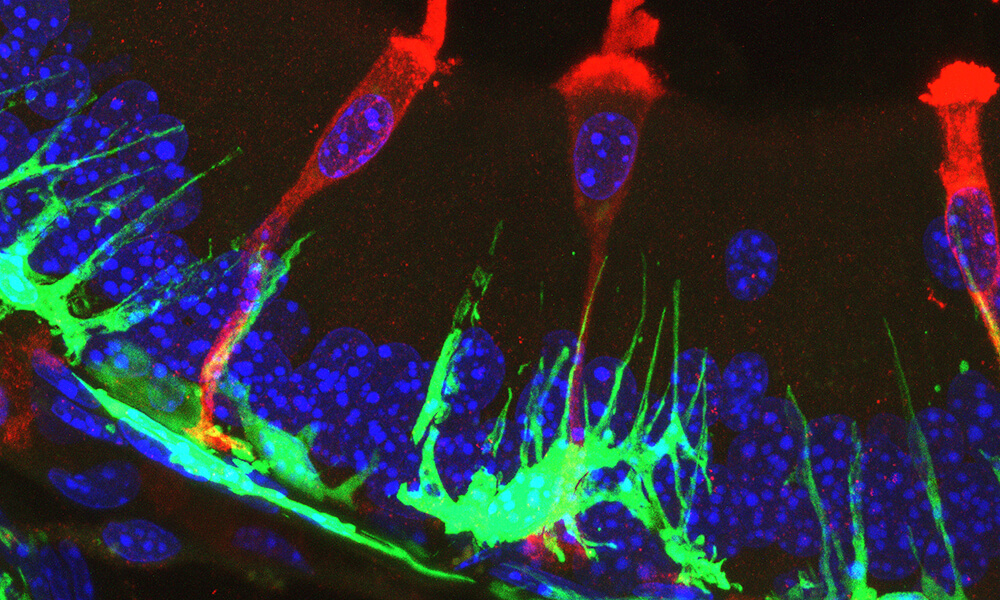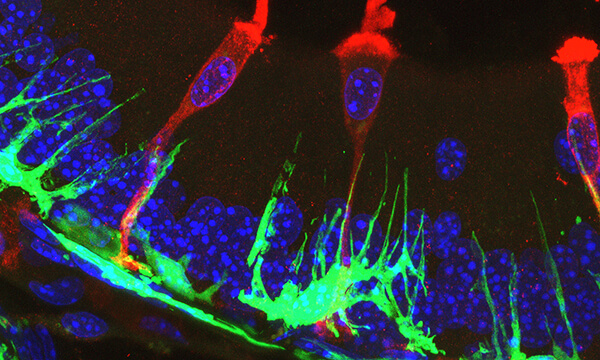Grief and Loss: Children and Teens
Browse through book suggestions and additional resources for children and teens who are grieving.
Weather AlertWe are monitoring the weather's impact on our services. If you are experiencing a medical emergency, call 911 or go to the nearest emergency department. Mass General Brigham's emergency departments remain open. For real-time updates and service changes, please check our Alerts page.View Alerts page
Contact Information
149-CNY, Rm 4326
149 13th St, Rm 4325H
Charlestown,
MA
02129
Email: mbattistone@mgh.harvard.edu
The Battistone Laboratory explores the molecular basis of mucosal immunity in the urogenital tract and applies the knowledge acquired through basic research to identify new diagnostic and therapeutic targets for male infertility and acute kidney injury (AKI). We are particularly intrigued by the paradigm-shifting discovery that epithelial proton-secreting cells modulate the immune system, and we explore the role of these cells in inflammation, which leads to epididymitis and AKI.
Infertility is a prevalent, disheartening condition for couples and individuals worldwide, and many cases of male infertility are thought to stem from immunological causes or are classified as idiopathic. Successful sperm maturation and storage rely on a unique immunological balance that protects the male reproductive organs from invading pathogens and spermatozoa—which appear during puberty after the immune definition of “self” has been established—from a destructive autoimmune response. We elucidate how epithelial clear cells communicate with immunocytes to contribute to the “immune privileged” environment that is optimal for sperm maturation and storage in the epididymis.
Uncontrolled inflammation is a leading cause of AKI, a frequent and fatal complication of hospitalized patients. Unfortunately, AKI is often diagnosed too late, and there is no specific cure. We address these needs by building upon a previously unrecognized role for renal proton-secreting epithelial cells, so-called intercalated cells in the onset of AKI. We showed the participation of the P2Y14 receptor in intercalated cells in inflammation that follow an ischemic renal injury. This groundbreaking finding pointed toward P2Y14 as a therapeutic target for the prevention/attenuation of AKI. Furthermore, collaborating with clinical investigators in the Nephrology Division at Mass General, we found that the P2Y14 ligand UDP-glucose is a urinary biomarker of AKI in patients undergoing cardiac surgery who developed AKI.

Maria Agustina Battistone, PhD
Assistant Professor of Medicine, Massachusetts General Hospital, Harvard Medical School
Maria Carolina Avenatti, MD
Postdoctoral Fellow
Angela Chen, BS
Research Assistant
Micah Cornelia Purba, BA
Graduate Student
Infertility affects 12%–15% of couples in the world, and male factors are involved in 40%–50% of these cases, half of which are classified as idiopathic. Spermatozoa acquire motility and fertilizing power during their transit through the epididymis, a long tube located downstream of the testis. One of the most intriguing and understudied aspects of male reproductive physiology is the ability of the epididymis to prevent the development of immune responses against autoantigenic spermatozoa while initiating very efficient immune responses against pathogens.
Our laboratory studies how epithelial cells work together with immune cells to protect spermatozoa against pathogens and autoimmunity and contribute to the immune-privileged environment of the epididymis. The long-term goal is to develop new strategic therapies for common disorders, such as male infertility and epididymitis, and to identify novel targets for male contraception.
Acute kidney injury is a frequent and fatal complication in hospitalized patients. Unfortunately, acute kidney injury is currently diagnosed only after a renal injury has occurred, and there is no specific cure for this deadly complication. Therefore, there is a clear need for the development of early markers of kidney injury and an associated therapy to reverse or prevent this complication.
We address this clinical gap by leveraging novel mechanisms by which epithelial proton-secreting intercalated cells communicate damage to immunocytes in the kidney. Uncontrolled inflammation is a leading cause of acute kidney injury. Ultimately, our research will fill gaps to understand the pathogenesis of renal failure.
Confocal microscopy image showing protrusions of clear cells (green) that interact with sperm (their head contain DNA [blue]) in the epididymis.
This microscopy image shows projections of a type of immune cells, mononuclear phagocytes (green), in very close proximity to epithelial narrow cells (red) in the epididymis. Understanding this will help us better understand certain causes of male infertility and develop male contraception methods.
View all publications of the Battistone Lab
We accept fellows and visiting scientists. Should you have any questions or are interested in joining our team, please contact Dr. Battistone.
Maria A. Battistone, PhD
Email: mbattistone@mgh.harvard.edu
Maria Agustina Battistone, PhD, received the 2022 Claflin Distinguished Scholars Award from the Massachusetts General Hospital Executive Committee on Research. This funding increases opportunities for women to advance to senior positions in academic medicine.
Ferran Barrachina Villalonga, PhD, received the 2022 Lonnie D. Russell Merit Award at the 47th American Society of Andrology (ASA) Annual Meeting (La Jolla, California, May 7-10, 2022). This award is conferred to the best original laboratory or clinical research report in andrology presented at the meeting.
Ferran Barrachina Villalonga, PhD, received the 2022 NIH-Travel Award to attend the 47th ASA Annual Meeting (La Jolla, California, May 7-10, 2022).
Browse through book suggestions and additional resources for children and teens who are grieving.
Find reading recommendations for families on how to understand and navigate when someone they care about is seriously ill.
Personal journal writing is described as a tool for self-reflection and growth during bereavement. Learn how to show up for your feelings using these ideas and journal prompts.
Find a checklist of tasks after a death: a list of people to notify, places to contact after the death of a loved one, and other resources through the Division of Palliative Care & Geriatrics at Massachusetts General Hospital.
Find resources tailored to grieving adults such as books on general loss, loss of a spouse or partner, loss of a parent and sibling, and more.
There is no right or wrong way to handle grief that comes around the holidays. Learn how to plan ahead and focus on your needs using this resource.

